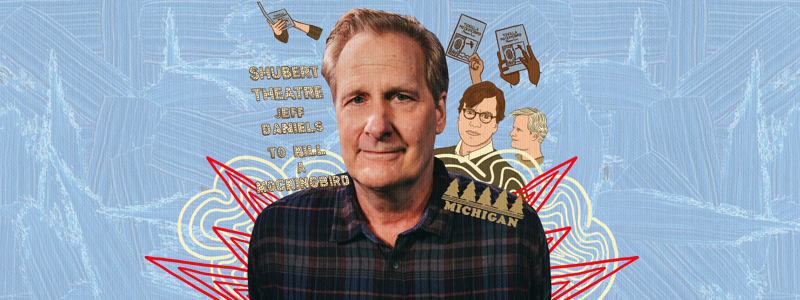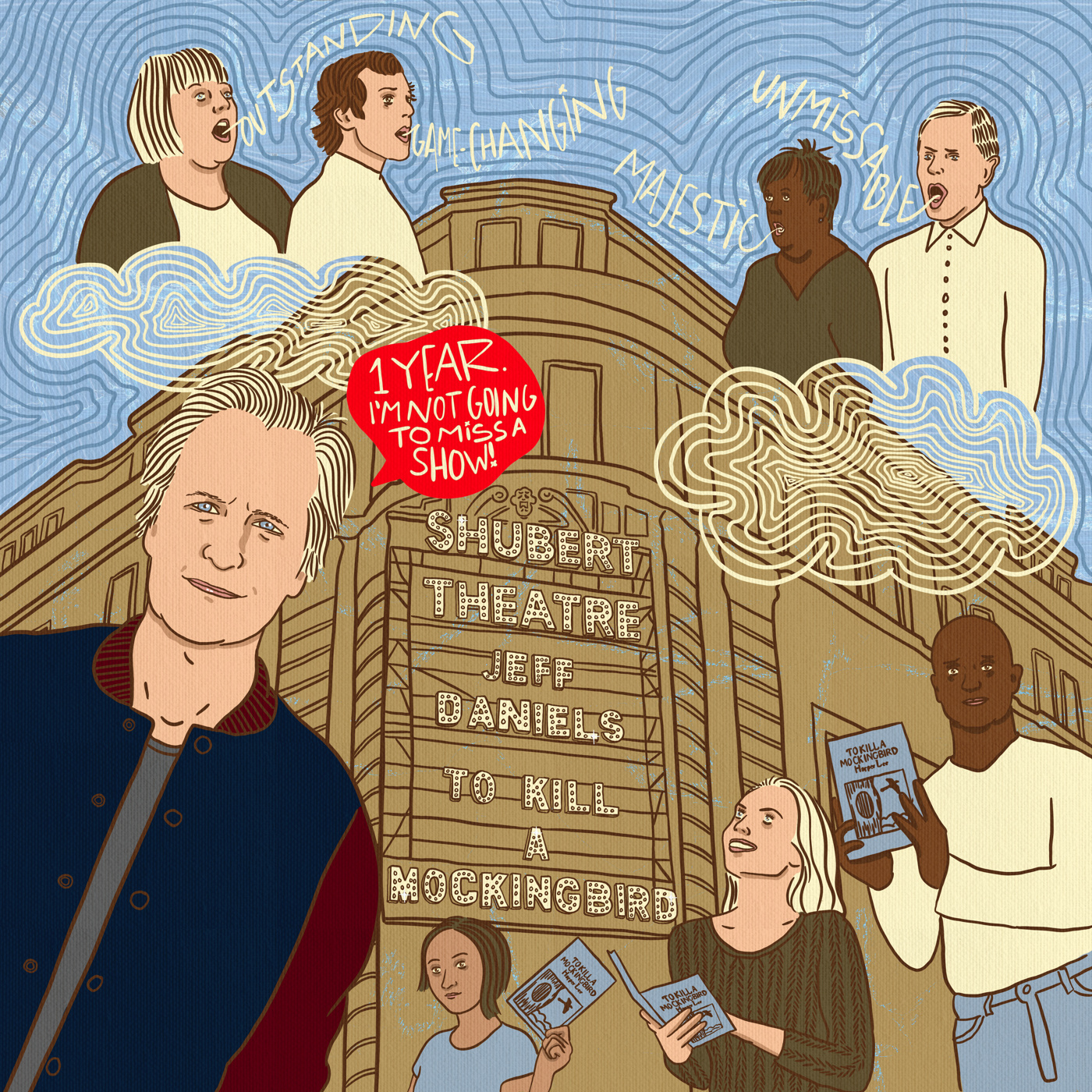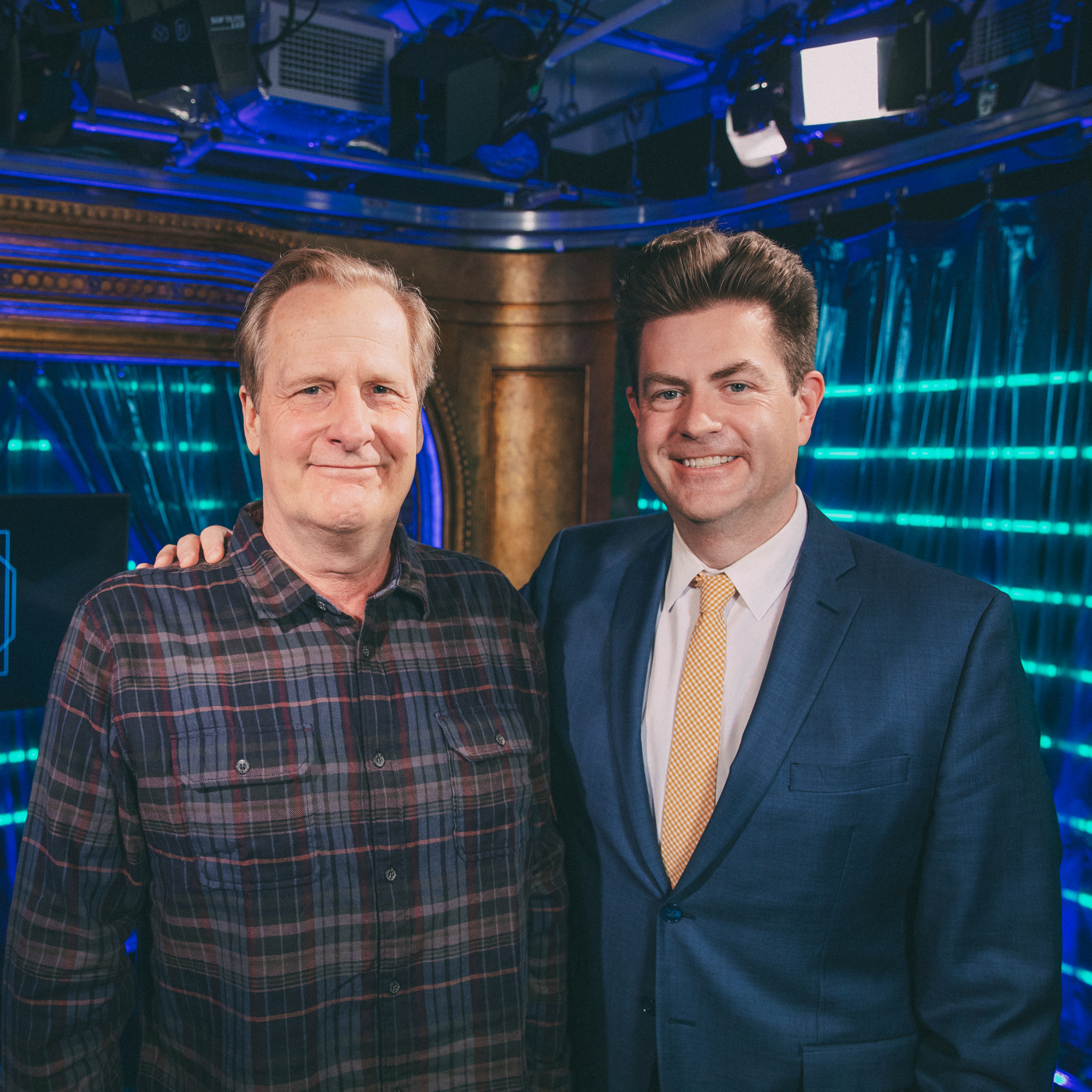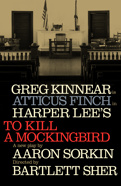
(Photo by Caitlin McNaney/Illustrations by Ryan Casey for Broadway.com)
To Kill a Mockingbird Star Jeff Daniels on His Admiration for Aaron Sorkin, Playing Tevye in High School & More on Show People
Jeff Daniels won Emmy Awards for Aaron Sorkin'sThe Newsroom as well as Godless and garnered Tony nominations for his performances in God of Carnage, Blackbird and now Sorkin's adaptation of Harper Lee's celebrated novel To Kill a Mockingbird. Known for a wide range of roles from Dumb and Dumber to The Looming Tower, Daniels is one of the most versatile actors of the stage and screen. Daniels stopped by Show People with Paul Wontorek to discuss why he chose to take on Atticus Finch, how his guitar gigs inform his acting, and the mission behind his Purple Rose Theatre Company in Michigan.

1. HE CAN'T GET OVER SEEING HIS NAME IN LIGHTS EVERY DAY
“I have about 190 pictures on my iPhone [of the marquee] because it won’t be there forever. It's an iconic role written by Aaron Sorkin. [Directed by] Bart Sher. [Produced by] Scott Rudin. At the Shubert. And the critics sing hosannas. It doesn’t get better than this. It just doesn’t. It’s the dream come true. It really is. It beats movies, beats TV. I can’t take two weeks off. They’re paying to see me—and others, but there is a responsibility that comes with being above the title. I take it very seriously. It’s a dream role. I enjoy it. We're months in, and it’s still alive every night.”

2. HIS TEVYE IS LEGENDARY
“Our production of Fiddler on the Roof was three hours long. There was no air conditioning in the high school auditorium. The bottle dance was done by three brothers from the same family. I glued a gray beard on. I had blond hair with bangs like an 18-year-old midwestern high school basketball player who had no clue what Jewish was. I saw the movie three or four times and did a dead-on Topol. The director was a little concerned that I didn’t know what the Jewish experience was truly about. So, she knew a guy that lived north of town that she was pretty sure was Jewish. She brought him in: ‘Frank’s over there. You want to go talk to him about being Jewish?’ I sat next to him: ‘So what’s it like being Jewish?’ He goes, ‘It’s not bad.’”

3. HE IS AARON SORKIN'S NUMBER ONE FAN
“I don’t fool around with guys like Aaron Sorkin. This was just over two years ago. He told me, ‘Scott Rudin just got the rights to the book. We want you to play Atticus. Bart Sher is directing.’ I said, ‘OK. So I should read the book,’ which was a stupid thing to say. He goes, ‘Yes, you should read the book.’ I told Aaron once, I get asked, ‘When do you know you’ve made it?’ When a writer like Aaron Sorkin hires you. Apparently, I’ve made it.”
Other must-read highlights:

(Photo: Caitlin McNaney for Broadway.com)
ON PREPARING TO TAKE ON THE ROLE OF ATTICUS
“During the workshops, you wouldn’t have known really that Atticus was going to come out of whatever it was I was doing. One of the great things Bart Sher told me was, ‘You need to slow down.’ I was so film and television: You get three takes. No rehearsal. Quick choices. Let’s go. I was in that mode six months before the first rehearsal. I backed right off, read and let it all come to me so that by the time I was ready to put on the suit, I was off-book before the first rehearsal. A few other people were too. You do that with a Mockingbird and the hype that’s going to come with it and the lawsuits. You’ve got to be so prepared so that when all that stuff hits you around opening, it’s Teflon.”
ON HIS MUSICAL SIDE
“I thought [music would be] what I’d be doing. I became an actor because people kept telling me I was good at it. I kept waiting to fail so miserably. I would be playing the guitar because that’s what you do when you’re sitting in your apartment in New York City on 23rd street in one room waiting for the phone to ring. It was a great solace, that thing. I probably would have troubadoured. You get a room of 200 people, and they’re right here. It’s fun to hold them. At the Shubert, there are times when the silence is deafening. You stand as Atticus in front of that crowd, and you start talking to them as if they’re the jury. You’ve got 1,400 people that aren’t moving. The familiarity I have doing that comes from those gigs of sitting onstage and making them laugh, laugh, laugh and then slipping in the one that makes them cry. It’s made me a better actor.”
ON HIS FATHER INSPIRING HIS ATTICUS
“[Atticus Finch says] ‘There’s goodness in everyone, you just have to care enough to look for it, and you’re going to care enough, y’hear?’ Yup, that was dad. That was dad. ‘Make sure you’re friends with the kids in town that don’t have a lot of money.’ My dad owned a lumber company, so relatively speaking, we had money from a small business that was successful. At his lumber company, there were parking spots, and he always parked in the one furthest away from the door. Not right up front by the door with his name on it. Furthest away from the door. Things like that.”
ON THE PURPLE ROSE THEATRE COMPANY
“I said, ‘What if I bought a building and I found actors in this area who didn’t get the breaks I did but either had the talent or the potential to be turned into actors that I can teach what I’ve learned and bring them up and do a New York-level acting style, directing style in front of 170 seats in the Midwest doing new plays? And you might want to write about the people sitting in the seats. I’m more interested in you looking at the people around you and writing what they think. Write what you think about what they think, and make them leave re-thinking what they think.’ We do new work, and we do it in a part of the country that—it’s not easy to do art there. There are people that certainly appreciate it, but for many people, art is for someone that lives north of town. So how do you get that guy going to the theater and get him to come to the next show? That’s where we are after 28 years.”
ON THE PLAY HE'S PENNING
“Lanford Wilson wrote a song called ‘Road Signs,’ and he gave it to me back in 1978. He had heard me in a dressing room writing. He said, ‘You write songs.’ I said, ‘Yeah. Yeah, I do.’ He said, ‘Let me help,’ and so he handed me a piece of paper. He goes, ‘It’s a poem about a bus trip I took from St. Louis up to Chicago. I don’t know. See if you can do something with it.’ There’s a play there. So that’s what I’m doing now. We’ll open it in January 2020. I’m writing it now. I’m doing eight shows a week with Mockingbird, but then that’s what I do during the day. I’m looking forward to that. I can find myself almost writing like Lanford. It’s fun to see where it goes.”
Watch the full episode of Show People with Paul Wontorek below!
Did you know Show People is available as a podcast? Check it out on iTunes and Spotify.

